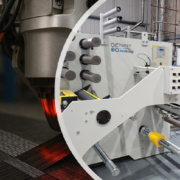Two New Members Added to BTMA, Number of Members Reached 49
The British Textile Machinery Association (BTMA) has started to make rapid progress in 2025 and has increased its membership to its highest level in recent years. BTMA’s membership has reached to 49 with the addition of Lancashire firms B&M Longworth and E+R Group.
Recycling System for Fibres and Polymers: DEECOM

B&M Longworth DEECOM fibre reclamation unit
With a long history in the manufacture and supply of specialised cleaning and waste-reduction technologies for the polymer and coating industries, Longworth developed of the DEECOM system for the recycling of both fibres and polymers.
DEECOM technology exploits pressurised steam in a process called pressolysis to successfully separate and reclaim fibres and polymers from composite parts for reuse, enabling true circularity for materials without the needs for solvents, chemicals, burning or mechanical grinding.
The technology is being commercialised for the composites industry in a partnership between Longworth and fellow BTMA member Cygnet Texkimp and a first DEECOM reclamation unit has recently been installed at the Henry Royce Institute in Manchester. Royce is bringing together nine leading institutes in a pioneering R&D programme to fully investigate and commercialise new applications for reclaimed fibres.
Longworth Have Already Received JEC World 2024 Innovation Award
Longworth and its partners in the Emphasizing Project, funded by Innovate UK, have already received the JEC World 2024 Innovation Award in the Circularity and Recycling category for the reclamation of materials from end of life wind blades, re-sizing and remanufacture into mass production car parts.
This resized material is based on DEECOM-recovered glass fibres that are treated with various chemistries to retain performance properties.
In the very latest news, at the end of January 2025, Longworth also claimed this year’s Make UK National Award in the Energy and Sustainability category for its pioneering DEECOM work.
Roll-to-roll automation

E+R’s latest Genesis Air coater is used for development in sectors such as battery technologies, fuel cells and medical products.
E+R Group is a leading manufacturer of roll-to-roll production machinery including advanced printing, coating, forming and vacuum deposition systems for end-use applications as diverse as carbon fibre prepregs, medical textiles, hydrophobic protective apparel and PEM fuel cells.
The group is also active in groundbreaking projects such as the Faraday Battery Challenge involving a consortium working to develop solid-state battery technology for automotive applications. These contrast with lithium-ion and other batteries which contain liquid or polymer gel electrolytes and could prove crucial in the UK’s quest to reach net-zero carbon emissions by 2050, through electrifying transport and devices.
The group’s low carbon machines are characterised by their robust design and ability to offer numerous substrate options and their design is aided by scientists at its in-house technology centre, who often work on game-changing projects with outside companies or universities.
The group is currently, for example, a member of the Faraday Battery Challenge consortium which is working to develop solid-state battery technology. Unlike lithium-ion and other batteries, solid-state batteries do not contain liquid or polymer gel electrolytes and could prove crucial in the UK’s quest to reach net-zero carbon emissions by 2050 through electrifying transport and devices.

BTMA CEO Jason Kent.
Other companies joining the BTMA ranks recently include Airbond, the developer of pneumatic yarn splicing enabling resource efficiency in the processing of expensive fibres like carbon and aramids, and Cambridge-headquartered Alchemie, which has been attracting a lot of attention with its advanced digital dyeing and finishing systems.
“It’s very encouraging that many of our members are now actively involved in the fields of advanced and smart new materials – primarily high performance fibres, technical textiles and composites –for high value industries such as aerospace, renewable energy, automotive and the medical sector,” says BTMA CEO Jason Kent. “An important factor underpinning this success is the collaboration between industry and the many universities and institutes in the UK which has never been as strong as it is right now.
On January 9th the Henry Royce Institute announced its National Materials Innovation Strategy in the House of Commons, aimed at further boosting an integrated approach to materials science that can address critical national challenges, boost economic growth and secure the UK’s position as a global leader in innovation.












